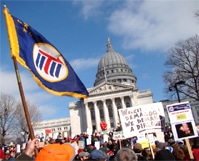SMART TD is sharing a recent study released by the Midwest Economic Policy Institute at the University of Illinois at Urbana-Champaign, which highlights the economic impact of declining unionization over the past decades across states in the Midwest.
The study found that as unionization declines, wealth inequality between workers and businesses continues to widen particularly in states that have passed so-called “right-to-work” laws (i.e. Michigan, Wisconsin, etc.).
The real goal of “Right-to-Work” is to lower wages for workers and divert that money to the owners and upper management of the company.
Click HERE for more information about the study.
Strength in numbers is what sustains our union and is the only thing that can turn the tide.
Your voice matters, so please take a minute to send a message to your representatives in Congress.
Click here to send your message in opposition of HR 785, the National Right to Work (FOR LESS) act; and in support of HR 233, The Safe Freight Act, that calls for two-person crews on all freight trains.
Tag: anti-union legislation
05/02/13 UPDATE: Ohio right-to-work bills were considered “dead-on-arrival” as Senate Republic President Keith Faber rejected the bills last night in an after-hours press conference.
“We have an ambitious agenda focused on job creation and economic recovery, and Right to Work legislation is not on that list. After discussions with other leaders and my caucus, I don’t believe there is current support for this issue in the General Assembly,” Faber said. “The only purpose this discussion serves right now is to generate a bunch of breathless fundraising appeals from the Ohio Democratic Party.”
Original Story:
Ohio has joined Pa. and Mo. in the fight against right-to-work bills. Today, two Republican Ohio Representatives Kristina Roegner and Ron Maag submitted bills seeking to take away rights from unions and their members in Ohio.
Roegner’s bill goes after private-sector unions such as UTU-SMART while Maag’s bill focuses on unions of the public sector.
Ohioans are clearly against this type of legislation with 60 percent of Ohio voters having voted down similar legislation in Senate Bill 5 (SB 5) that was introduced in 2011. SB 5 almost cost Ohio Republican Governor John Kasich his job when he sought to make SB 5 law without allowing Ohioans to vote on it. Petitions and outcries were heard loud and clear in Ohio’s government and SB 5 went to the people to be voted on in November 2011 and was voted down.
Ohioans are still working on getting an amendment passed that would allow the people of Ohio to vote to remove a governor from office as a result of the SB 5 fiasco.
Kasich has refused to support any right-to-work bill since SB 5 failed and has instead remained focused on other legislation. Kasich has yet to weigh in on the new legislation that was introduced today.
Pennsylvania and Missouri are also facing similar bills in their respective Houses. Recently, the state of Maine rejected right-to-work bills in both the state House and Senate, effectively killing those bills.

Ten different unions marched in downtown Chambersburg, Pa., in protest of the bill over the weekend. If passed, the bills would allow non-union members the same benefits that dues-paying members receive, such as higher wages and benefits and union representation.
House Bill 50, sponsored by Rep. Daryl Metcalfe, seeks to end union membership or dues payment by non-members as a condition of employment.
House Bill 51, sponsored by Rep. Kathy Rapp, seeks to prohibit unions from collecting dues from non-union public school employees.
House Bill 52, sponsored by Rep. Fred Keller, would prohibit unions from collecting dues from non-union state employees.
House Bill 53, sponsored by Rep. Jim Cox, seeks to prohibit unions from collecting dues from non-union local government employees. Rep. Stephen Bloom is also proposing House Bill 250, that would repeal a state law known as “maintenance of membership.” The bill would essentially allow dissatisfied union members to quit their union at any time, as opposed to a current 15-day window toward the end of contracts. Rep. Jerry Knowles also seeks to pass an umbrella bill that would prevent union membership from being a condition of employment in the private sector.
Metcalfe has introduced this union-busting legislation in every session over the past 14 years. This year is viewed as different, because Republicans control both the House and Senate of the Pennsylvania Legislature, as well as the governor’s seat.
Legislators in favor of the bill hope to introduce it to the House speaker soon.